Wenhao Zhan
Accelerating RL for LLM Reasoning with Optimal Advantage Regression
May 27, 2025Abstract:Reinforcement learning (RL) has emerged as a powerful tool for fine-tuning large language models (LLMs) to improve complex reasoning abilities. However, state-of-the-art policy optimization methods often suffer from high computational overhead and memory consumption, primarily due to the need for multiple generations per prompt and the reliance on critic networks or advantage estimates of the current policy. In this paper, we propose $A$*-PO, a novel two-stage policy optimization framework that directly approximates the optimal advantage function and enables efficient training of LLMs for reasoning tasks. In the first stage, we leverage offline sampling from a reference policy to estimate the optimal value function $V$*, eliminating the need for costly online value estimation. In the second stage, we perform on-policy updates using a simple least-squares regression loss with only a single generation per prompt. Theoretically, we establish performance guarantees and prove that the KL-regularized RL objective can be optimized without requiring complex exploration strategies. Empirically, $A$*-PO achieves competitive performance across a wide range of mathematical reasoning benchmarks, while reducing training time by up to 2$\times$ and peak memory usage by over 30% compared to PPO, GRPO, and REBEL. Implementation of $A$*-PO can be found at https://github.com/ZhaolinGao/A-PO.
Regressing the Relative Future: Efficient Policy Optimization for Multi-turn RLHF
Oct 06, 2024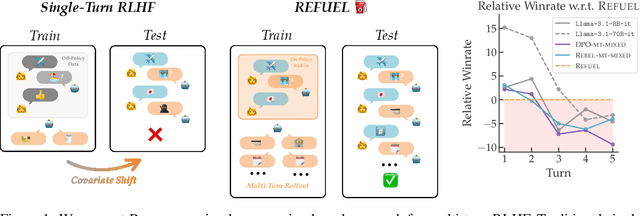
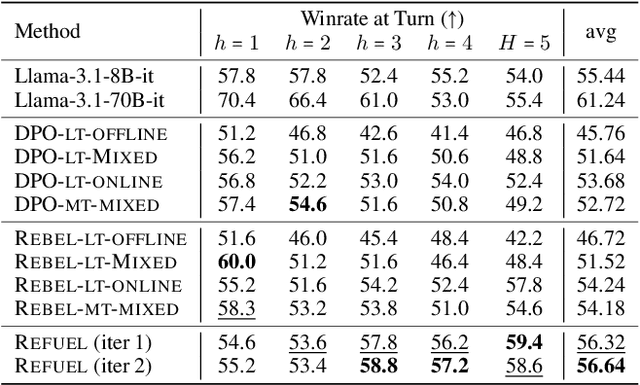
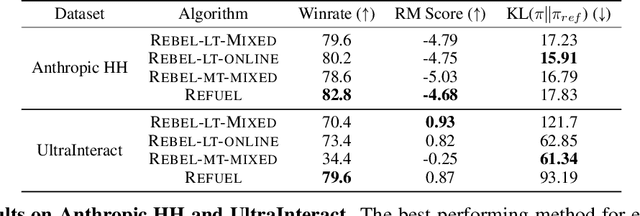
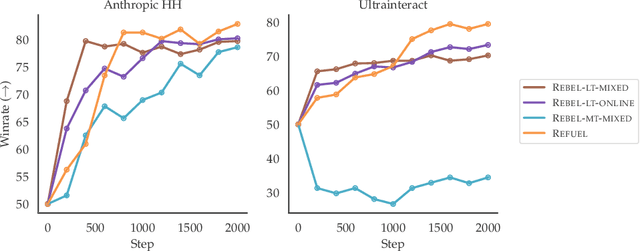
Abstract:Large Language Models (LLMs) have achieved remarkable success at tasks like summarization that involve a single turn of interaction. However, they can still struggle with multi-turn tasks like dialogue that require long-term planning. Previous works on multi-turn dialogue extend single-turn reinforcement learning from human feedback (RLHF) methods to the multi-turn setting by treating all prior dialogue turns as a long context. Such approaches suffer from covariate shift: the conversations in the training set have previous turns generated by some reference policy, which means that low training error may not necessarily correspond to good performance when the learner is actually in the conversation loop. In response, we introduce REgressing the RELative FUture (REFUEL), an efficient policy optimization approach designed to address multi-turn RLHF in LLMs. REFUEL employs a single model to estimate $Q$-values and trains on self-generated data, addressing the covariate shift issue. REFUEL frames the multi-turn RLHF problem as a sequence of regression tasks on iteratively collected datasets, enabling ease of implementation. Theoretically, we prove that REFUEL can match the performance of any policy covered by the training set. Empirically, we evaluate our algorithm by using Llama-3.1-70B-it to simulate a user in conversation with our model. REFUEL consistently outperforms state-of-the-art methods such as DPO and REBEL across various settings. Furthermore, despite having only 8 billion parameters, Llama-3-8B-it fine-tuned with REFUEL outperforms Llama-3.1-70B-it on long multi-turn dialogues. Implementation of REFUEL can be found at https://github.com/ZhaolinGao/REFUEL/, and models trained by REFUEL can be found at https://huggingface.co/Cornell-AGI.
Exploiting Structure in Offline Multi-Agent RL: The Benefits of Low Interaction Rank
Oct 01, 2024

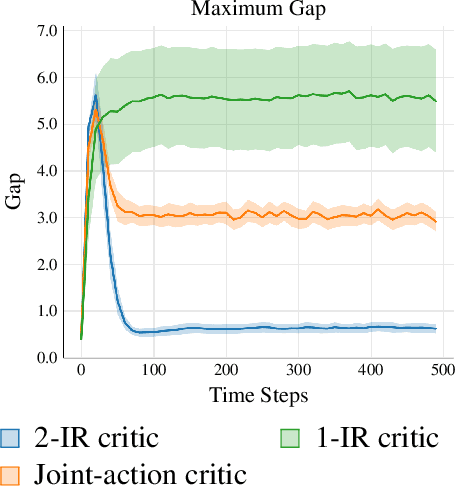

Abstract:We study the problem of learning an approximate equilibrium in the offline multi-agent reinforcement learning (MARL) setting. We introduce a structural assumption -- the interaction rank -- and establish that functions with low interaction rank are significantly more robust to distribution shift compared to general ones. Leveraging this observation, we demonstrate that utilizing function classes with low interaction rank, when combined with regularization and no-regret learning, admits decentralized, computationally and statistically efficient learning in offline MARL. Our theoretical results are complemented by experiments that showcase the potential of critic architectures with low interaction rank in offline MARL, contrasting with commonly used single-agent value decomposition architectures.
Correcting the Mythos of KL-Regularization: Direct Alignment without Overparameterization via Chi-squared Preference Optimization
Jul 18, 2024


Abstract:Language model alignment methods, such as reinforcement learning from human feedback (RLHF), have led to impressive advances in language model capabilities, but existing techniques are limited by a widely observed phenomenon known as overoptimization, where the quality of the language model plateaus or degrades over the course of the alignment process. Overoptimization is often attributed to overfitting to an inaccurate reward model, and while it can be mitigated through online data collection, this is infeasible in many settings. This raises a fundamental question: Do existing offline alignment algorithms make the most of the data they have, or can their sample-efficiency be improved further? We address this question with a new algorithm for offline alignment, $\chi^2$-Preference Optimization ($\chi$PO). $\chi$PO is a one-line change to Direct Preference Optimization (DPO; Rafailov et al., 2023), which only involves modifying the logarithmic link function in the DPO objective. Despite this minimal change, $\chi$PO implicitly implements the principle of pessimism in the face of uncertainty via regularization with the $\chi^2$-divergence -- which quantifies uncertainty more effectively than KL-regularization -- and provably alleviates overoptimization, achieving sample-complexity guarantees based on single-policy concentrability -- the gold standard in offline reinforcement learning. $\chi$PO's simplicity and strong guarantees make it the first practical and general-purpose offline alignment algorithm that is provably robust to overoptimization.
REBEL: Reinforcement Learning via Regressing Relative Rewards
Apr 25, 2024Abstract:While originally developed for continuous control problems, Proximal Policy Optimization (PPO) has emerged as the work-horse of a variety of reinforcement learning (RL) applications including the fine-tuning of generative models. Unfortunately, PPO requires multiple heuristics to enable stable convergence (e.g. value networks, clipping) and is notorious for its sensitivity to the precise implementation of these components. In response, we take a step back and ask what a minimalist RL algorithm for the era of generative models would look like. We propose REBEL, an algorithm that cleanly reduces the problem of policy optimization to regressing the relative rewards via a direct policy parameterization between two completions to a prompt, enabling strikingly lightweight implementation. In theory, we prove that fundamental RL algorithms like Natural Policy Gradient can be seen as variants of REBEL, which allows us to match the strongest known theoretical guarantees in terms of convergence and sample complexity in the RL literature. REBEL can also cleanly incorporate offline data and handle the intransitive preferences we frequently see in practice. Empirically, we find that REBEL provides a unified approach to language modeling and image generation with stronger or similar performance as PPO and DPO, all while being simpler to implement and more computationally tractable than PPO.
Dataset Reset Policy Optimization for RLHF
Apr 15, 2024
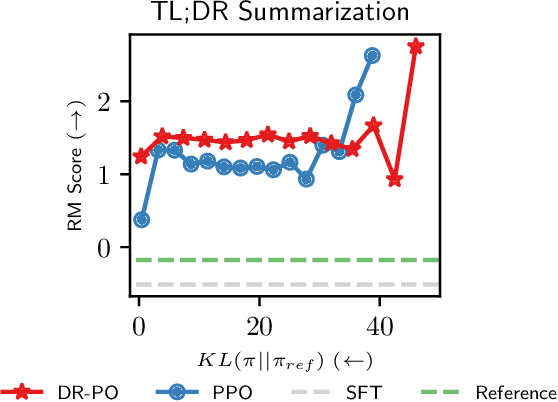


Abstract:Reinforcement Learning (RL) from Human Preference-based feedback is a popular paradigm for fine-tuning generative models, which has produced impressive models such as GPT-4 and Claude3 Opus. This framework often consists of two steps: learning a reward model from an offline preference dataset followed by running online RL to optimize the learned reward model. In this work, leveraging the idea of reset, we propose a new RLHF algorithm with provable guarantees. Motivated by the fact that offline preference dataset provides informative states (i.e., data that is preferred by the labelers), our new algorithm, Dataset Reset Policy Optimization (DR-PO), integrates the existing offline preference dataset into the online policy training procedure via dataset reset: it directly resets the policy optimizer to the states in the offline dataset, instead of always starting from the initial state distribution. In theory, we show that DR-PO learns to perform at least as good as any policy that is covered by the offline dataset under general function approximation with finite sample complexity. In experiments, we demonstrate that on both the TL;DR summarization and the Anthropic Helpful Harmful (HH) dataset, the generation from DR-PO is better than that from Proximal Policy Optimization (PPO) and Direction Preference Optimization (DPO), under the metric of GPT4 win-rate. Code for this work can be found at https://github.com/Cornell-RL/drpo.
Optimal Multi-Distribution Learning
Dec 08, 2023



Abstract:Multi-distribution learning (MDL), which seeks to learn a shared model that minimizes the worst-case risk across $k$ distinct data distributions, has emerged as a unified framework in response to the evolving demand for robustness, fairness, multi-group collaboration, etc. Achieving data-efficient MDL necessitates adaptive sampling, also called on-demand sampling, throughout the learning process. However, there exist substantial gaps between the state-of-the-art upper and lower bounds on the optimal sample complexity. Focusing on a hypothesis class of Vapnik-Chervonenkis (VC) dimension $d$, we propose a novel algorithm that yields an $varepsilon$-optimal randomized hypothesis with a sample complexity on the order of $(d+k)/\varepsilon^2$ (modulo some logarithmic factor), matching the best-known lower bound. Our algorithmic ideas and theory have been further extended to accommodate Rademacher classes. The proposed algorithms are oracle-efficient, which access the hypothesis class solely through an empirical risk minimization oracle. Additionally, we establish the necessity of randomization, unveiling a large sample size barrier when only deterministic hypotheses are permitted. These findings successfully resolve three open problems presented in COLT 2023 (i.e., Awasthi et al., (2023, Problem 1, 3 and 4)).
Provably Efficient CVaR RL in Low-rank MDPs
Nov 20, 2023Abstract:We study risk-sensitive Reinforcement Learning (RL), where we aim to maximize the Conditional Value at Risk (CVaR) with a fixed risk tolerance $\tau$. Prior theoretical work studying risk-sensitive RL focuses on the tabular Markov Decision Processes (MDPs) setting. To extend CVaR RL to settings where state space is large, function approximation must be deployed. We study CVaR RL in low-rank MDPs with nonlinear function approximation. Low-rank MDPs assume the underlying transition kernel admits a low-rank decomposition, but unlike prior linear models, low-rank MDPs do not assume the feature or state-action representation is known. We propose a novel Upper Confidence Bound (UCB) bonus-driven algorithm to carefully balance the interplay between exploration, exploitation, and representation learning in CVaR RL. We prove that our algorithm achieves a sample complexity of $\tilde{O}\left(\frac{H^7 A^2 d^4}{\tau^2 \epsilon^2}\right)$ to yield an $\epsilon$-optimal CVaR, where $H$ is the length of each episode, $A$ is the capacity of action space, and $d$ is the dimension of representations. Computational-wise, we design a novel discretized Least-Squares Value Iteration (LSVI) algorithm for the CVaR objective as the planning oracle and show that we can find the near-optimal policy in a polynomial running time with a Maximum Likelihood Estimation oracle. To our knowledge, this is the first provably efficient CVaR RL algorithm in low-rank MDPs.
How to Query Human Feedback Efficiently in RL?
May 29, 2023Abstract:Reinforcement Learning with Human Feedback (RLHF) is a paradigm in which an RL agent learns to optimize a task using pair-wise preference-based feedback over trajectories, rather than explicit reward signals. While RLHF has demonstrated practical success in fine-tuning language models, existing empirical work does not address the challenge of how to efficiently sample trajectory pairs for querying human feedback. In this study, we propose an efficient sampling approach to acquiring exploratory trajectories that enable accurate learning of hidden reward functions before collecting any human feedback. Theoretical analysis demonstrates that our algorithm requires less human feedback for learning the optimal policy under preference-based models with linear parameterization and unknown transitions, compared to the existing literature. Specifically, our framework can incorporate linear and low-rank MDPs. Additionally, we investigate RLHF with action-based comparison feedback and introduce an efficient querying algorithm tailored to this scenario.
Provable Offline Reinforcement Learning with Human Feedback
May 24, 2023Abstract:In this paper, we investigate the problem of offline reinforcement learning with human feedback where feedback is available in the form of preference between trajectory pairs rather than explicit rewards. Our proposed algorithm consists of two main steps: (1) estimate the implicit reward using Maximum Likelihood Estimation (MLE) with general function approximation from offline data and (2) solve a distributionally robust planning problem over a confidence set around the MLE. We consider the general reward setting where the reward can be defined over the whole trajectory and provide a novel guarantee that allows us to learn any target policy with a polynomial number of samples, as long as the target policy is covered by the offline data. This guarantee is the first of its kind with general function approximation. To measure the coverage of the target policy, we introduce a new single-policy concentrability coefficient, which can be upper bounded by the per-trajectory concentrability coefficient. We also establish lower bounds that highlight the necessity of such concentrability and the difference from standard RL, where state-action-wise rewards are directly observed. We further extend and analyze our algorithm when the feedback is given over action pairs.
 Add to Chrome
Add to Chrome Add to Firefox
Add to Firefox Add to Edge
Add to Edge